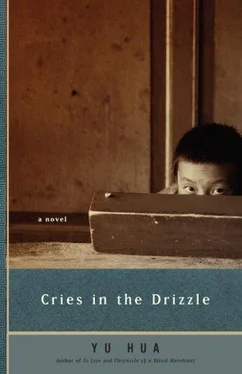In the summer my grandma's mother-in-law sat in the reception room, wearing a black silk dress, fanned by a maid dressed in cotton. She maintained a grave demeanor as she discussed the illnesses that afflicted her. She could not tolerate the slightest moan in the house, not even her own, for she believed such sounds to be just as pernicious as the outbreak of unruly laughter. My grandmother found herself immersed for long stretches of time in her mother-in-law's accounts of her various pains and aches; you can imagine what a joyless atmosphere prevailed. But psychologically my grandmother was not so profoundly affected by the prevailing gloom, for her father had already administered an education that was not all that different in tone. The deadness of family life was relieved only in the evening, when her husband's brief fervor in bed invested the proceedings with a certain animation. But my grandmother felt perfectly at home and took it all in stride, and until she clambered onto my grandfather's back she could barely have imagined that a family might operate any differently. In the same way she had no clue that her face was really very pretty, and it took my grandfather's constant reassurance and earnest compliments to finally convince her of this point, something that her father, husband, and mother-in-law had always kept tightly under wraps.
I cannot shed much more light on my grandmother's life in that household, for their experiences, like they themselves, are long dead and gone. But in the first few years after my grandmother's death, loneliness and sorrow filled Granddad with enthusiasm for her past, and when a light shone in his gray eyes my grandmother came alive again in his retelling of her story.
The turning point in my grandmother's destiny came on a fine, clear morning. She was young and beautiful then, not the wizened old lady I saw later. Although she herself possessed a staidness compatible with the family into which she had married, she was only eighteen, and a young woman who spends her days in a dark mansion is easily drawn to the singing of birds outside. Dressed in a red tunic, with embroidered slippers on her feet, she stood on the stone steps. The early morning sun lit up her healthy complexion, and her delicate hands hung charmingly by her sides. A pair of perky sparrows chirped on a tree in the courtyard and unveiled a little repertoire of actions that she found captivating. In her ignorance, she did not realize that they were engaged in courtship, and was deeply touched by their intimacy and ardor. Her absorption in the wonderful mood of that morning rendered her completely unaware of her mother-in-law's ponderous steps approaching. As the sparrows continued to posture and preen, the unsmiling mother-in-law could not allow her impropriety to continue one minute longer, and frightening words suddenly resounded in my grandmother's ears. The old lady said to her coldly, “Time to go inside.”
My grandmother was never to forget the shock she experienced at that moment. When she turned around, it was not just the usual dourness that confronted her; she saw instead, in her mother-in-law's keen and complex gaze, her own uncertain future. She was smart enough to realize immediately that the splendid little show put on by the sparrows must actually be a very shady piece of business. She returned to her room with a premonition that she was now in deep trouble, and her heart thumped in her chest with the awareness that the very course of her life had been thrown into doubt. She listened as her mother-in-law shuffled into another room, and soon other, sprightly footsteps approached, those of a maid. The maid entered the study and summoned her sleepy husband.
A silence ensued, as though nothing whatsoever had happened, but my grandmother's unease expanded by degrees, and with time a certain element of anticipation combined with her misgivings. She suddenly looked forward to the punishment coming sooner rather than later, for suspense could only make her more nervous.
At dinner my grandmother sensed right away that misfortune was about to befall her, for her mother-in-law was unusually nice to her and on occasion became quite red around the eyes, while her husband seemed doleful. Her mother-in-law had her stay behind after the meal and launched into a lengthy disquisition, reviewing their impeccable family history, emphasizing that — whether in terms of scholarship or government service— theirs was a heritage of which their posterity would be proud. What is more, their ancestors had produced a paragon of female chastity, the recipient of an official honor from a Qing emperor who had a soft spot for women. Here she really hit her stride, and waxed so lyrical on this subject that she could hardly drop the topic. In the end, however, she got to the point and told my grandmother she should get her things together. She could hardly have made it more obvious: a bill of divorce was on its way.
For my grandmother it was an unforgettable night. Her remote husband for once expressed affection for her, not by saying anything to her, but (according to what she later told my grandfather) by showering her with caresses — Granddad did not mention tears. It was perhaps on account of this evening that she always remembered him, and so later, as described by my grand-father, this dissolute character took on the virtues of a man who knew how to look after a woman.
My grandmother's mother-in-law lived at the tail end of the old order, and was not as despotic as her progenitors, for she did not tell her son what to do but gave him a choice, even though she knew all along what his choice would be. The next morning my grandmother rose early; her mother-in-law, even earlier. When her husband arrived in the reception room, he resumed his customary aspect, and my grandmother was hard put to find in his expression any trace of the previous nights sorrow. They had breakfast together. What was going through her mind in those moments? Still so young, she felt completely lost. Disaster was about to overtake her, there was no question about that, but before its arrival my grandmother felt dizzy, and everything in front of her swayed in an inchoate blur.
Then all three of them left the house, and my grandmother's mother-in-law, in her black clothes, led them to the highway. She instructed my grandmother to go west, while she for her part headed east. At this time the din of the Japanese war machine was steadily growing closer, and scattered clumps of refugees could be seen moving along the road. The matriarch committed to upholding the family's honor headed off toward the sunrise, while my grandmother set out in the other direction and the sun's first rays illuminated her back. As he had his last glimpse of her receding figure, her husband was stricken with grief, but his decision to follow his mother east was unhesitating.
My grandmother carried a heavy bundle on her back; inside were her clothes and jewelry, as well as some silver dollars. Her face exhibited a ghastly pallor; in the thirty years that followed, it would never again be rosy pink. The morning breeze blew her hair into disarray, but she did not have time to notice this as she was sucked into the flow of refugees. Joining them was perhaps a comfort to her, because it obscured her status as a divorced woman, and the helpless misery on her face could be seen on other faces too. My grandmother was like a leaf swept along in the current; she lumped together her misfortune and the others’ exodus. It was unthinkable that she return to her father's home and throwing in her lot with the horde of evacuees took the edge off her agonized consideration of her future.
My grandmother, who had been raised in such a sheltered environment, now found herself on the road during a full-blown war, but the trauma she suffered was quite unrelated to the outbreak of hostilities. Her darkest moment came when she ran into a man identifiable now only as a butcher. My grandmother recognized him as such on the basis of the pork grease and raw stench that his body exuded. In the decades that followed, she would tremble and shake at the smell of uncooked pork. This brute ravished my grandmother as briskly as if he were chopping meat.
Читать дальше












